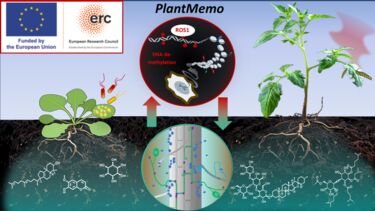The "PlantMemo" project will explore the intricate mechanisms by which plants develop a "memory" of past stresses, enabling them to enhance their defense capability against recurrent threats.
Plants, unlike animals, lack a mobile immune system or direct communication with their offspring. Yet, they excel in adapting to changing conditions, a capacity that relies in part on their ability to store and integrate information from previously encountered stresses. This immune memory allows plants to acquire long-term resistance and even prepare their progeny against persistent threats - offering a powerful natural alternative to conventional crop protection strategies.
PlantMemo will focus on two key pathways through which plants develop their memories:
- Internal (Epigenetic) Mechanisms: The project will investigate how changes in the plant's epigenetic makeup – biochemical modifications to the DNA and associated proteins in the nucleus of the cell that don't alter the underlying DNA sequence itself– contribute to a lasting defence memory. The epigenetic regulatory system driving these changes allows plants to "write," maintain, and "erase" immune memory as needed.
- External (Microbial) Interactions: The research team will also be examining the role of the root-associated soil microbiome in shaping and transmitting this memory. Stressed plants are known to change their root exudation chemistry, which conditions the soil microbiome for disease suppression activities. These so-called ‘soil legacies’ can significantly influence a plant's ability to withstand stress from pests and diseases, forming a crucial external component of its adaptive capacity.
This generous grant from the European Research Council puts our lab in a unique position to tackle the long-standing question of how long-lived plants - without a brain or immune system - manage to survive in ever-changing, hostile environments.
While most research has focused on plants’ immediate immune responses to pests and diseases, this project will explore longer-term survival strategies. These include internal epigenetic mechanisms that can be passed on to the progeny of stressed plants, as well as external pathways involving chemical root exudates that condition the soil microbiome for disease suppression. Although our focus is on fundamental discovery, I’m confident the findings will pave the way for sustainable biotechnologies to better protect crops from rising biological threats.
Professor Jurriaan Ton
The 2.5 million euro project is funded by an Advanced Grant from the European Research Council (ERC) and involves a strategic collaboration with Utrecht University, The Netherlands. The project will combine advanced epigenomic profiling with (epi)genetic manipulation to map the networks driving internal memory. In addition, the project will develop methods to identify key genes and root metabolites that condition the soil for disease-suppressive microbial communities, and investigate the contributions and interactions between these two plant memory mechanisms.
This research holds great promise for sustainable agriculture. By understanding and potentially harnessing plant memory, PlantMemo seeks to facilitate innovations that can improve crop health, vitality, and resilience. Such advancements could reduce the dependence on chemical pesticides.

